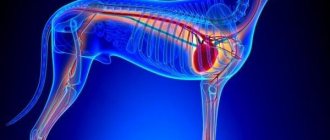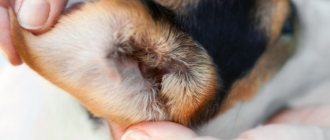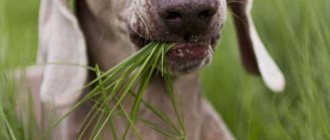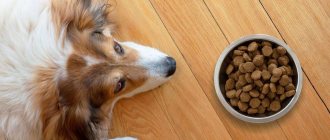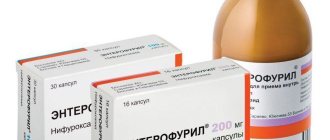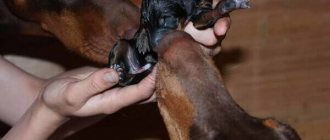What is hiccups in dogs? This reaction of the body brings discomfort to your four-legged friend and quite frightens the owners. You cannot advise your pet to hold his breath; he physiologically does not know how to control such a process. In most cases, this effect does not pose a threat to the student. The main factor behind hiccups is compression of the diaphragm. The causes of hiccups in dogs can be simple stress, fear or rapid consumption of food. Sometimes this reaction appears in the morning, after sleep. Let's look at more detailed conditions, why does the dog hiccup?
The main causes of hiccups in puppies
Especially at an early age, doggies often suffer from hiccups. With age, such attacks noticeably decrease. Doctors even call puppy hiccups a specific “growing disease.” Yes, for most children, such a reaction is not a source of concern, but you need to watch the child. If it continues for more than an hour, then it’s time to consult a veterinarian. There are really plenty of reasons why puppies hiccup:
- High activity.
- Excessive appetite, when a puppy quickly eats food, he swallows air, which, in turn, causes a spasm of the diaphragm.
- Dry food.
- Hypothermia.
- Heat.
- Psychological factors: fear, anxiety, stress, etc.
- Pinched nerve endings.
- The little ones have not yet developed the alimentary tract - this is a kind of adaptation to the environment.
Such manifestations do not pose a threat to the life of dogs, but there are factors that are dangerous for young and older organisms:
- Pathology of the gastrointestinal tract.
- A foreign body in the stomach that was swallowed by a playful animal.
- Injury.
- Heart diseases.
- All kinds of parasites.
You can help your child get rid of discomfort with a tummy massage. Walking with moderate activity has a beneficial effect. It is very important that if the manifestations are more serious, prolonged, and even accompanied by other symptoms, this is a reason to contact the clinic as soon as possible.
Is it dangerous
Hiccups themselves, as a physiological reaction, do not pose a danger to the life of the animal . The degree of danger of an attack for a dog is determined by how serious its causes are.
If the disorder is episodic in nature, the attacks last a short time and go away on their own, then there is no reason to worry. This is a natural reaction of the body to one or another external irritation.
If hiccups continue for a long time, attacks are repeated daily, accompanied by other alarming symptoms, then you need to look for internal pathology, which is the cause of sudden spasms of the diaphragm. It is necessary to take the animal to a veterinary clinic as soon as possible for professional diagnostics.
After identifying the primary disease, treatment will be prescribed that will help eliminate not only the symptom, but also its cause.
Causes and types of hiccups in dogs
The dog hiccups reasons why this happens? Just like in cubs, the adult body reacts to various factors: hypothermia, overeating, overexertion, etc. Hiccups are divided into safe (natural, short) and dangerous (long).
Causes of natural hiccups in dogs
- during sleep, sometimes the body presses on the diaphragm;
- anxiety, fear;
- after eating, quickly absorbing food, or food cut into large pieces - all this leads to irritation of the gastrointestinal system;
- manifestation of pregnancy;
- swallowing air;
- sudden awakening after sleep;
- drying out of the nasopharynx, etc.
Hypothermia
Hiccups are a common reaction to hypothermia. In cold, drafty conditions, the muscles of animals tense to retain heat. The visible manifestation of a chilled animal is hiccups. Pets with short hair and smooth coats suffer more from cold weather. Or if the dog is very small, decorative. For example: Yorkies, Pekingese, Dachshunds, Chihuahuas, Beagles, Corso, etc. The owner of such a “creature” often buys all kinds of outfits for his pupils. In order to protect the body from all kinds of hypothermia. In cold weather, such breeds have less walking time. Frost is less dangerous for dogs that are specially bred for cold weather, rescue operations, and protection, but they can also have a manifestation for various reasons. For example: Labrador, German Shepherd, Laika...
Prevention
After eating, the dog should drink enough water. It is not advisable to cut meat into too large pieces, because a hungry animal can quickly swallow food without sufficient chewing, which will lead to unpleasant consequences.
Read Why the dog is shaking: what to do if your pet has chills
Avoid excessive activity, let the dog periodically rest and recuperate. It is also important that your pet sees a veterinarian regularly for checkups.
Hiccups cause a lot of concern among owners, but in most cases they go away within a few minutes. It is important to take into account the duration and frequency of this phenomenon in a dog in order to identify the disease in time and relieve the pet of unpleasant sensations.
Is it possible to ignore hiccups?
A short-term reaction will not harm your pet, but a long-term, constant reaction may indicate health problems. Visually, everything is fine with the dog, but it continues to periodically hiccup; this may be a consequence of the following diseases:
- Pathologies of the central nervous system. In addition, the four-legged dog exhibits additional symptoms: tremors of the limbs, loss of coordination, and inability to concentrate the pet.
- Respiratory problems. Added: rapid breathing, cough, snoring.
- Gastrointestinal diseases. Indigestion, diarrhea, flatulence, etc. The dog also licks his lips and tries to vomit.
- Heart diseases. Perhaps even a pre-stroke or pre-infarction condition, if the hiccups do not stop within two hours.
Additional Information
. If your pet licks the floor and hiccups, this is a clear sign of a stomach problem.
What to do and should you worry
There is no need to feed the puppy immediately after playing, it is better to give him time to calm down
If you notice that your pet is hiccupping, you need to watch it. Mild hiccups after eating or an active walk that quickly stop should not cause concern.
You can offer your dog softer, liquid food. Often, hiccups occur due to the rapid ingestion of dry food granules. Clean drinking water should always be available. Do not give your puppy food that is too hot.
If your puppy gets hiccups while sleeping, you can turn him into a more comfortable position to prevent pinched nerves. Usually this problem goes away after 2-3 months as the dog grows up.
You can relieve mild hiccups by massaging your abdomen. An unscheduled walk without overexertion also helps. Positive emotions will distract the puppy and stop involuntary contractions of the diaphragm.
Long-term hiccups are a sign of disease
The previous section revealed what diseases frequent hiccups can cause. But in addition to various pathological symptoms, it can be a sign of various damage from external sources:
- There is a foreign object in the stomach. Just like puppies, adults can be very curious, which leads to them exploring things around them.
- Worms. If this is the reason, you can see parasites in the burp.
- Trauma to the body. There may be visual symptoms of bruises, etc.
- It can start if your little brother suddenly jumps up and runs after sleeping or resting. After waking up, the dog may often have a warm nose. Choleric dogs, due to their irrepressible nature, experience prolonged or periodic hiccups. This manifestation is not dangerous; it characterizes the energetic character of the pet more.
The reasons why a dog often hiccups can be very serious. This reaction is a consequence of internal or external negative factors. Timely treatment is the key to your friend’s health.
The puppy hiccups every day - reasons for constant hiccups
If your puppy hiccups every day, it is very important to determine the causes of constant hiccups as quickly as possible.
- Everyday hiccups are usually observed in puppies up to 3-5 months of age, during a period of intensive growth and development.
- Most often, daily attacks of hiccups indicate a severe infection with helminths and the presence of pathogenic bacteria in the body.
- This condition indicates indigestion, flatulence, and overeating.
- If a puppy behaves restlessly and unnaturally during hiccups, and symptoms uncharacteristic of a healthy dog are noticeable, there is no need to guess what caused this condition. Contact your veterinarian for help.
What to do with short and long-term hiccups: when to contact a veterinarian
With a short (non-dangerous) manifestation, you need to find the root cause of the occurrence, then take action:
- If the phenomenon is caused by overeating, you can give your dog warm water, massage his belly, or give him a piece of sugar.
- Try to dance with your pet; air will come out when he burps.
- If hypothermia occurs, the best medicine is to warm the animal.
- You can also distract your four-legged dog by playing or running.
Important to remember
– long-term manifestation may indicate various diseases. Therefore, the best way to protect your “companion” is the services of a veterinarian. Often, during long attacks, drugs are prescribed: metoclopramide, seduxen, etaprazine, aminazine, etc.
How to help
The owner can independently help the pet only if it is known that the dog is healthy and hiccups are a natural reaction of the body.
Simple measures will help eliminate the factors that provoke the attack, and, therefore, speed up its completion:
- It is necessary to monitor how the ward takes food. It is useful to encourage him to eat more slowly by placing a bowl of clean water next to the food . If hiccups do start, you should gently massage your stomach, give you a drink of warm water, and distract you with a piece of sugar or a cookie.
- If the dog swallows some air along with food, it should be removed from the stomach. To do this, put the dog on its hind legs and hold it in an upright position until the air burps.
- If the hiccups are associated with hypothermia, you should immediately warm the dog, thereby eliminating the risk of a cold.
- During an attack, it is useful to distract the dog by offering to play. A walk in the fresh air will help change the breathing rhythm, which will also help the hiccups end as quickly as possible.
- Frequently recurring attacks often indicate that the dog is infected with worms. To eliminate this provoking factor, regular deworming should be carried out. In childhood, the procedure is carried out regularly every 3 months, in young animals and adult dogs - every six months.
What to do if hiccups don't stop?
If home attempts to stop hiccups are unsuccessful, you should take the animal to the veterinarian as soon as possible.
The doctor may determine that the attacks are caused by instability of the nervous system, a violent reaction to a stressful situation, or fear. In this case, sedative drug therapy has a good effect.
As prescribed by the doctor, the owner will be able to independently treat the pet with medications that reduce anxiety levels and reduce the reaction to stress.
Typically, in such cases, injections of the following medications are prescribed:
- Cerucal. This drug has an antiemetic and antihiccup effect, improves the quality of digestion, and eliminates the reflux of gastric juice into the esophagus.
- Seduxen. A tranquilizer, has a sedative-hypnotic effect, relieves muscle spasms, treats stress and stress-like conditions, and increased anxiety.
- Aminazine. Neuroleptic with a strong sedative effect. Relieves psychomotor agitation, reduces anxiety and stress response. The drug has a side effect - a strong hypnotic effect.
